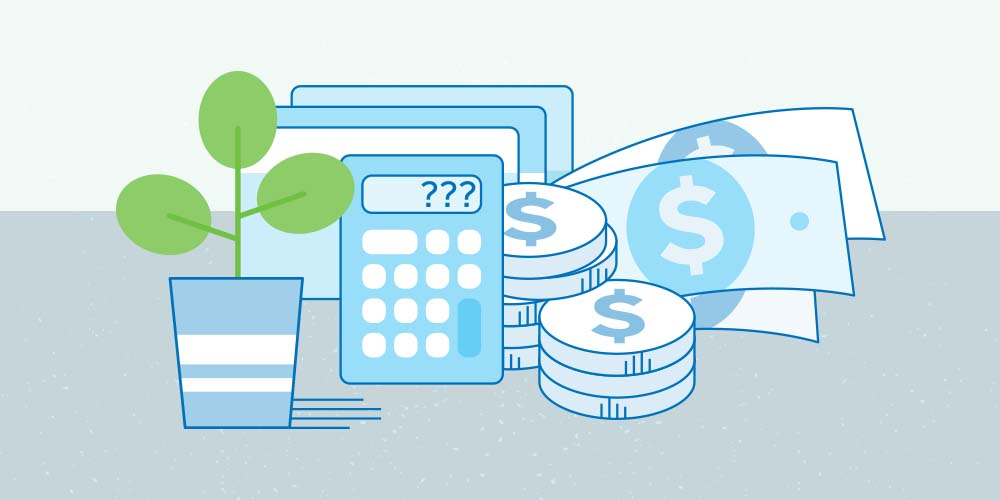Do you ever wonder if your financial situation is on par with your peers – if you're "normal"? Do you have a fear of missing out (also known as FOMO) on the latest financial hack that everyone else is using? Since money and finances can be a touchy subject – one that we're not always willing to (honestly) share – we've done the research for you to give you a better idea of how everyone else is managing their money when it comes to debt, savings and investing.
Is my debt really high?
Despite what some recent headlines may have you side-eyeing, not all Canadian millennials are in debt due to overspending on avocado-related products. As a matter of fact, the data says the opposite is true. A study conducted by Angus Reid1 shows that when asked about their current debt loads (excluding mortgages), 44% of millennials say their debt is less than $25K, with 26% saying they're actually debt-free; 13% admit they're in debt between $25-$50K in total. Considering that on average our generation graduated post-secondary education with $26K in outstanding student loans (according to Statistics Canada), we don't seem to be doing too bad overall.
Millennials in this country, for the most part, aren't saddled with astronomical debt loads – go us! Especially when you factor in that our age bracket is still ramping up toward our peak earning years. Hopefully this eases your mind as you count down the days until your student loan is paid off, knowing that your debt likely isn't much higher than the next guy or gal. But if you want advice on how to tackle your debt – check out our debt mini-series.
How much should I have saved?
A study conducted by Abacus Data2 reveals that the majority (75%) of Canadian millennials have some degree of savings, while the remainder have none. Of that majority, 24% say they have up to $5K saved and 13% have between $5-$10K in the bank.
No matter where you fall in that spectrum, one thing is for sure when it comes to your savings – you need to prepare for the unexpected. You should have an emergency savings account with funds to cover your expenses for at least 3-6 months. Use our emergency savings calculator to get an estimate suited to your individual situation. An emergency savings account gives you access to funds in (often unpredictable) situations, such as job loss, a medical emergency, expensive car or home repairs or emergency travel.
At this stage in your life, the amount you have stashed away is less important than having a financial plan with clearly defined goals. We tend to share some common big goals, such as retirement and/or a down payment for a house. While our smaller goals vary based on our individual interests or priorities, creating a plan to achieve these goals, and laying the foundation for good savings habits, is key early on. Time is on your side – offering the potential to increase your contributions as your career advances and your income grows.
Investing – is everybody doing it?
Maybe it's because we came of age during the Great Recession…or it could be we like having easy access to our money, but data shows that while many millennials are saving, the majority aren't investing. So if you've been wary of breaking into the investment scene, you're not alone. The Abacus Data study of millennial investment behavior shows that of the three quarters who are saving, only 41% invest their money in growth options such as stocks, bonds or specialized growth products like RRSPs or GICs.
Millennials have earned a reputation as the "most risk averse generation since the Great Depression" (whether we deserve this moniker or not is up for debate). Though 69% of us believe that a savings account is the safest place to stash our cash, this isn't the only reason we're shying away from investing.
Surveyors asked millennials to rate the confidence they have in their knowledge of self-managing their investments. The results showed only 14% described having "a lot" of confidence, while half said they had "some" and 35% admitted they had "little" confidence in their knowledge. This suggests what we really need is an investing education to up our confidence. If you're interested in dipping a toe, we've laid out the basics of how to build a GIC laddering strategy – it's a great place to start.
For those who are investing – where's the money going? The most common vehicles are RRSPs (38% have savings in one) and employer pension plans (29% take advantage of one). Mutual funds are the next most common investment, with 26% of millennials owning some. Less common are individual stocks and bonds, exchange traded funds (ETFs) and bitcoin or other cryptocurrencies.
The best part about investing now for your future is that you will reap the rewards of compound interest. Since your money will (hopefully) sit in an investment vehicle for many years as you prepare for retirement, that money will have lots of time to grow due to interest. Then you'll earn interest on the entire amount—so you'll be earning interest on your interest. The sooner you begin investing, the more time your money will sit, and the more compound interest you can take advantage of!
Whether you're investing or not, have some savings put away or are working to become debt-free, it's normal to wonder if you're on the right track. If you're looking for more affirmation, a financial advisor is a great money buddy – someone to cheer you on, reset your focus when necessary and keep you in loop on what's new with money (FOMO no more).
1http://angusreid.org/millennial-finance-debt-savings/
1http://canadianmillennials.ca/millennials-save-but-why-dont-they-invest/


